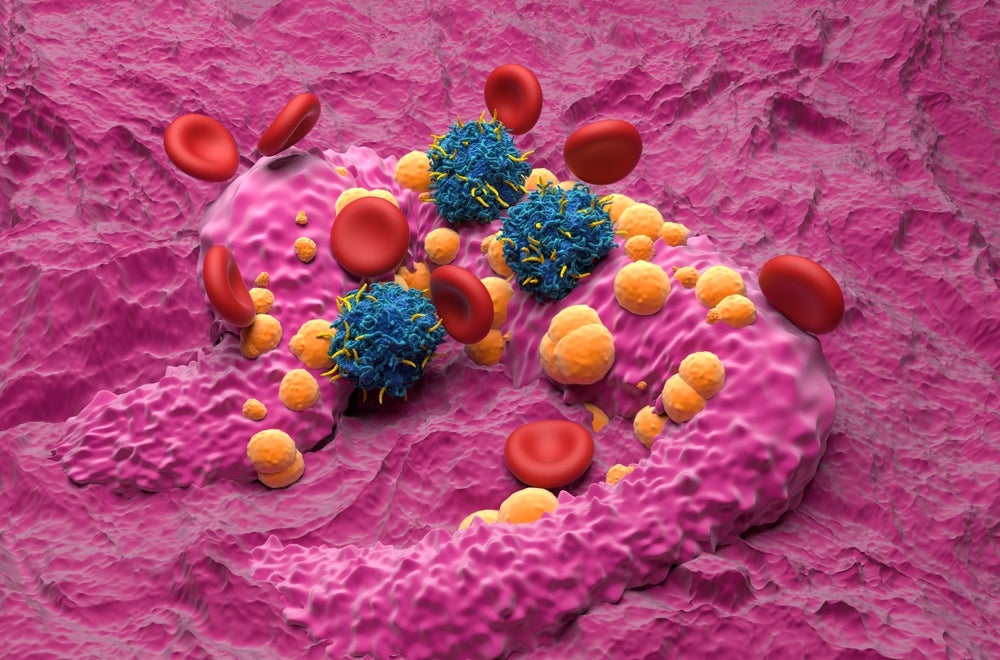Advanced hepatocellular carcinoma (aHCC) has a dire prognostic outlook, with an 18.4% five-year survival rate in non-metastatic cases and a 2% rate in metastatic disease. At the European Society of Medical Oncology (ESMO) Congress 2024, the results of the Phase III APOLLO trial, which assessed the viability of an immunotherapy/tyrosine kinase inhibitor (IO-TKI) combination for the first-line treatment of aHCC, were presented. The study evaluated Chia Tai Tianqing Pharmaceutical’s Focus V (anlotinib) in combination with Akeso’s penpulimab. Focus V is a novel multi-kinase inhibitor that acts on vascular endothelial, fibroblast, and platelet-derived growth factor receptors, effectively filling a potent multirole in stopping tumour angiogenesis, and penpulimab is a programmed cell death protein 1 (PD-1) checkpoint inhibitor. The study randomised 649 patients 2:1 to receive either the Focus V plus penpulimab combination (n=423) or sorafenib (n=212), a long-established aHCC treatment. The Focus V arm showed significant improvement in progression-free survival (PFS) with a median PFS of 6.9 months, compared to sorafenib’s 2.8 months (p<0.0001). Overall survival (OS) improved similarly to PFS in the Focus V treatment arm (16.5 versus 13.2 months; p=0.0012). The safety profile of the Focus V arm was manageable, with fewer treatment-related adverse events (TRAEs) compared to sorafenib. This news was well received at ESMO owing to the previous failure of the LEAP-002 trial, where Merck’s Keytruda (pembrolizumab) could not prove a clinically significant benefit in combination with levantinib.
Elevar Therapeutic’s PD-1 IO camrelizumab and TKI rivoceranib had clinical data presented from the CARES-310 Phase III trial, which enrolled 543 patients. Similar to Focus V and penpulimab, this IO-TKI combination was compared against sorafenib in first-line HCC. The trial demonstrated similar results to APOLLO, with the IO-TKI arm generating significant benefits to PFS (5.6 versus 3.7 months, p<0.0001) and OS (22.1 versus 15.2 months, p<0.0001). One area where Focus V and penpulimab seem to hold an edge over Elevar’s combination is in their safety profile, with fewer TRAEs compared to sorafenib. This improvement over sorafenib wasn’t seen with the camrelizumab and rivoceranib combination. Focus V and penpulimab are competitive IO-TKIs in the first-line landscape for treating aHCC and generally exhibit a well-tolerated safety profile. Ultimately, the greatest competition lies outside of the IO-TKI domain. The field has seen Roche’s Tecentriq with bevacizumab rise as a first-line standard of care in the aHCC space. This approval was granted on the back of a Phase III trial that showed Tecentriq plus bevacizumab significantly improved median PFS compared to sorafenib alone (6.8 versus 4.3 months, p<0.001) and had a relatively indifferent safety profile. Leading data and analytics company GlobalData’s patient-based HCC forecast predicts Tecentriq sales will grow to $980m across the eight major markets (8MM: the US, France, Germany, Italy, Spain, the UK, Japan, and China) by 2029. While the Focus V and penpulimab combination is offering strong performance, it is not the first in the IO-TKI space to demonstrate tangible results, and it will face great difficulty toppling Tecentriq from its current seat atop the aHCC first-line treatment paradigm.






